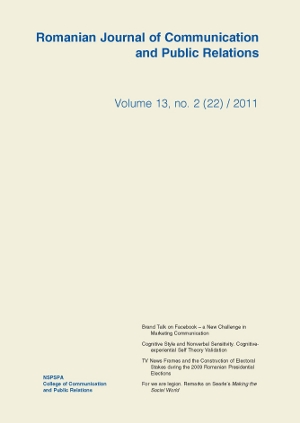Cognitive style and nonverbal sensitivity. Cognitive-experiential self theory validation
Cognitive style and nonverbal sensitivity. Cognitive-experiential self theory validation
Author(s): Loredana IvanSubject(s): Psychology
Published by: Editura Comunicare.ro
Keywords: Cognitive experiential theory; Rational Experiential Inventory; nonverbal sensitivity
Summary/Abstract: This article presents the cognitive-experiential self theory (Epstein, 2000; 2003) and argues about the importance of this model in studying individuals’ abilities to decode nonverbal elements. Using REI 40 (Pacini & Epstein, 1999), the main instrument suggested by the model, to assess subjects’ differences in rational and experiential processing modes, a validity and reliability analysis of this scale for a Romanian student sample is presented. Results confirm the presence of the two subscales but, contrary to the initial model, the two dimensions were rather interdependent measuring the general tendency of subjects to use their cognitive resources (both rational and intuitive) in order to accomplish a particular task. In addition, we obtain a new scale, REI24, with high overall internal consistency (α = .91) and reliable along the two dimensions, for the considered sample. We discuss the predictive value of the new instrument in nonverbal decoding tasks, underlining the importance of including external motivators in experimental designs based on CEST theory. This research is supported by POSDRU/89/1.5/S/62259 program.
Journal: Revista Română de Comunicare şi Relaţii Publice
- Issue Year: XIII/2011
- Issue No: 2
- Page Range: 31-49
- Page Count: 19
- Language: English

